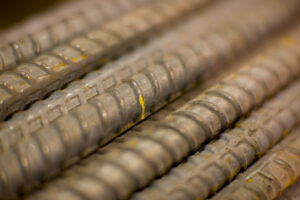
What is Rebar Used For?
Few materials are as ubiquitous and essential as rebar in manufacturing and construction. This robust, versatile reinforcement material plays a critical role in the strength and stability of various structures. “What is rebar used for?” is not only a question for term papers. Understanding rebar’s applications and benefits and how to choose the right rebar for the project are essential in choosing a steel rebar supplier.
What is the Main Purpose of Rebar?
Short for reinforcing bar, rebar is a steel bar used to reinforce concrete and masonry structures. Rebar is a fundamental construction component for concrete structures because concrete is strong under compression but relatively weak against tension. Rebar addresses concrete’s weakness by providing tensile strength across construction and industrial applications. Added this reinforcement helps prevent concrete from cracking under stress, ensuring the structural integrity of the build.

What is Rebar Used for in Construction?
Building Foundations – One of the most common uses of rebar is in building foundations. Foundations bear the weight of entire structures, making strength and durability paramount. Rebar provides the necessary tensile strength to prevent cracking and shifting, ensuring a stable base for buildings of all sizes.
Concrete Slabs – Rebar is also extensively used in concrete slabs for floors, pavements, and driveways. By reinforcing concrete slabs, rebar helps distribute loads more evenly and prevents cracking under pressure. This reinforcement is particularly crucial in areas subjected to heavy traffic or significant weight loads.
Roads, Bridges, and Infrastructure – Construction crews use rebar extensively to create highway roads, bridges, and related infrastructure. Rebar gives added strength to the concrete pavement, enhancing durability and longevity. Bridges rely on rebar reinforcement for concrete decks, piers, and abutments that must support traffic loads and resist water and high winds. Rebar-reinforced concrete linings prevent tunnel collapses, and massive concrete dams hold significant water pressure and natural forces back.
What are Some Industrial and Specialized Rebar Applications?
Manufacturing Facilities – Industrial assembly lines, factories, and manufacturing facilities often require reinforced concrete floors and foundations to support massive machinery and heavy equipment. Rebar strengthens and enhances the load-bearing capacity of concrete structures for safety and stability under consistent operational stress. Reinforcement is vital for preventing structural failures that threaten safety or disrupt production.
Power Plants – Concrete is common in various types of power plants, with rebar reinforcing the material used in cooling towers, containment structures, turbine foundations, and elsewhere. Energy facilities operate under extreme conditions and must handle significant mechanical loads, making reinforced concrete critical to structural integrity. Rebar ensures energy-producing structures can withstand daily intense pressures and environmental conditions.
Marine Structures – Marine and coastal environments present unique engineering and architectural challenges due to water exposure and repeated pressure from waves or the tide. Rebar is instrumental in constructing docks, piers, levees, and seawalls to reinforce concrete against harsh conditions, extending the usable lifetime of water-adjacent structures. Rebar provides durable concrete in maritime structures to endure wet and constant stress.
Seismic-Resistant Structures – While seismic activity is not the most common natural disaster concern in the Midwest, areas prone to earthquakes rely on rebar to help construct seismic-resistant structures. Specialized heavy-duty rebar for withstanding substantial seismic forces can help keep buildings, bridges, and other structures standing during an earthquake.
Choosing the Right Rebar for Your Project
Selecting the appropriate rebar for your project is crucial to ensuring your construction’s structural integrity and longevity. Here are some key factors to consider when choosing rebar:
Grade of Rebar – The rebar grade refers to its tensile strength, which is critical in determining its ability to withstand forces without breaking. Common grades include Grade 40, Grade 60, and Grade 75, with the numbers indicating the minimum yield strength in ksi (thousands of pounds per square inch). Grade 60 rebar is a standard choice for most construction projects due to its balance of strength and flexibility.
Size of Rebar – Rebar comes in various sizes, typically from #3 to #18, where the number corresponds to the diameter in an inch. The size of rebar needed depends on the specific requirements of your project. For instance, smaller projects like residential slabs may use #3 or #4 rebar, while larger infrastructure projects like bridges might require #8 or larger.
Coating and Corrosion Resistance – Choosing coated rebar is essential in environments where corrosion is a concern, such as coastal areas or structures exposed to chemicals. Epoxy-coated and galvanized rebar offer enhanced resistance to rust and corrosion, significantly extending the structure’s lifespan. Although more expensive, stainless steel rebar provides superior corrosion resistance and durability.
Rebar Shapes and Forms – Rebar is available in various shapes, including straight bars, bent shapes, and mesh. The choice depends on the design and structural needs of your project. Bent rebar is often used in footings and columns, while mesh rebar is common in slabs and walls for uniform reinforcement.
Compliance with Standards – Ensure the rebar you select complies with industry standards such as American Society for Testing and Materials (ASTM) specifications. Industry-standard compliance guarantees the rebar meets necessary quality and performance benchmarks, ensuring safety and reliability.
Count On Westfield Steel to Be Your Trusted Steel Rebar Supplier
Rebar is an indispensable component in construction and industrial applications, giving the missing and necessary tensile strength to reinforce concrete structures effectively. Westfield Steel’s experts can provide added value by performing any cutting, bending, forming, or other light fabrication required of your rebar or concrete-reinforcing mesh solutions.
Westfield Steel understands each project has unique requirements, and our team can help you find the best solutions. Across projects large and small, our high-quality steel rebar will enhance the strength and durability of your concrete structures. Connect with a Westfield Steel expert today to learn more about our in-stock rebar sizes, grades, and dependable delivery.
Back